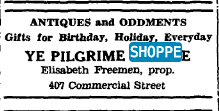There is no doubt that Elisabeth Freeman’s radical life continued although the entire scene was muted by political and cultural oppression. The record largely goes silent with the exception of one article in 1935. We know that she worked for a time for the Lighthouse for the Blind and during the Depression for Emergency Home Relief in NYC, where she raged against a bureaucracy that put itself before people, and gave potatoes to the Chinese and rice to the Irish. She counted among her friends famous people: Louis B. Mayer of Metro Goldwyn Mayer Film Studios, the playwright Elmer Rice, writer/producer Wendell Phillips Dodge, and Father Divine, a unique evangelist who always put on a feast for the community.
A devout Christian Scientist, she was essentially asked to leave the Mother Church due to her radical work with pacifists and socialists. She was subsequently invited to join the Fellowship of Reconciliation, a humanist peace and justice group in NYC.
From scattered correspondence we can imagine that she was still active in radical causes, writing to “political prisoner” Earl Browder, prisoner Louise Olivereau, to an acquaintance in England about a mutual acquaintance who was killed “escaping” jail, and attending a ceremony honoring James Weldon Johnson. Included also are two membership letters kept in the collection from The Nation and The International Radical Club. She made at least one trip to England, looking up radical friends and writing a piece on the Socialists Convention. Elisabeth was detained by British Intelligence for attempting to smuggle in “seditious, Bolshevik literature.” Her escape from this was detailed by American and British intelligence.
For several summers she ran an antique shop in Provincetown, then an art colony and home of the avant garde theater troupe, the Provincetown Players. She also had some benefactors including “Jedediah Tingle” an anonymous philanthropist who sent her money when “things were rough”, and Mrs. Crane (of the plumbing fortune) who allegedly gave her an apartment in California.
Elisabeth Freeman retired to Altadena, California and promptly joined the local chapter of the National Woman’s Party, still led by Alice Paul, and dedicated to passage of the Equal Rights Amendment (ERA). From her correspondence to her nieces we know that she continued her strong belief in peace and labor issues. She died of pleurisy on Feb. 27th, 1942. In the publication Equal Rights of the National Woman’s Party, they wrote of her life:
Soap-box orator, banner bearer, colorful organizer, always the hardest work fell to her lot and was conquered by her enthusiasm…Her contribution to the cause of women never faltered.
1920-1942 Out of the Limelight, Still in the Struggle Additional Information

Ye Pilgrime Shoppe
A recent trip to Provincetown revealed some new information about Elisabeth Freeman’s “retirement” occupation, an antiques store on Commercial St. For one thing I had the wrong building; matching up pictures of the store with existing establishments was off. A check in the archives of the town’s newspaper, The Advocate, put the address as 407 Commercial […]


